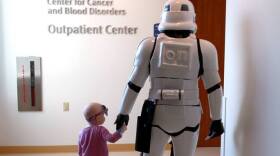Employers in southwest Florida are searching for employees with expertise in specific areas, which may require additional schooling beyond a standard college degree. Enter micro-credentials.
Micro-credential programs are designed for students to reskill, which means to learn new, unfamiliar skills that provide opportunities to join a new field; and to upskill, which means to learn advanced, additional skills in something they’re already familiar with.
They have been around for over a decade, but with COVID-19 changing how many businesses function, employees need ways to find opportunities to reskill and upskill their existing skillsets. Florida Gulf Coast University joined this national initiative during the 2020-21 academic year. Students earn a digital badge when they’ve passed a course, showing their proficiency in the topic.
“I'm planning to take at least one course each semester, just to take advantage of these opportunities to upskill myself,” Zhishan Liang, a FGCU student pursuing a master’s degree in accounting and taxation, said. “And I know that when I graduate here, and go out there in the real world, these badges or these knowledge and skills will just put me in a better advantage.”

“There are specific skills needed for individuals to really gain competencies that keeping up with this fast-changing environment in business and workplaces,” Dr. Aysegul Timur, the vice president and vice provost for Strategy and Program Innovation at FGCU, said. “So, we thought that we could create micro-credentials and digital badges to prepare our students for this.”
The micro-credential program at FGCU currently has courses in cyber security, artificial intelligence, internet of things, cloud computing, data science, blockchain technology, quantum computing, and design thinking.
“Once you complete a micro-credential you earn a digital badge. What that digital badge means, you are demonstrating the mastery of skills in that particular area, but the beauty of the badge is that it includes metadata,” Dr. Timur said.
Students use the digital badges on their resumes and LinkedIn pages so future employers can view them. The digital badge isn’t just an image to show course completion, it displays metadata of skills that the specific student learned through the program and details about the course.

The Lee County Economic Development Office recently gave a $1 million grant to cover the cost of some micro-credential courses for Lee County residents provided by the American Rescue Plan Act.
Degree-seeking students, community members, and working professionals who are looking to advance their knowledge can take these courses at no cost if they’re residents of Lee County.
Florida Southwestern State College has also partnered with the Lee County Economic Development Office to provide free college credit certificates and micro-credentials courses to Lee County residents.
FGCU worked alongside internal and external partners to determine regional skills gaps that employees lacked and what employers expect. From this, FGCU created a series of micro-credential programs and partnered with IBM Skills Academy, which introduces students to technology education and provides students with a digital badge when completing their micro-credential program.
Dr. Timur says that students are guaranteed an interview if they apply to the partners that worked to create the micro-credential program.
The micro-credential courses are designed to be small scope programs that focus on a specific set of skills.
“It's a more fast-pace, it's more engaging,” Liang said about the artificial intelligence micro-credential course she took fall 2021. “A traditional college course, I spend 16 weeks learning about a course, whereas this course is 8 weeks.”
As the program is growing, FGCU will be introducing fundamentals of the medical device industry, essentials of professional sales, emergency preparedness, and management micro-credential courses during the fall 2022 semester. Programs focusing on construction management and senior care are expected to be available for students in the near future.

“It's wonderful that FGCU is stepping forward, taking a leadership role, and providing these unique and in-demand job skill sets for people that want to participate in these new career fields and we are so excited to be part of this process, connecting people with jobs of the future,” Dr. Chrissann Ruehle, IBM Artificial Intelligence Practitioner-Instructor and FGCU marketing instructor, said.
Micro-credentials at FGCU vary in cost, ranging around $400 to $500 without coverage, depending on the structure and length of the specific micro-credential program. However, scholarship opportunities and assistance are provided to those who don’t qualify for the grant.
“It opens up a lot of doors for individuals to gain some new skill sets,” Dr. Ruehle said. “Perhaps they are thinking about making a career change and they see all the different job opportunities that are available for data analysts and data scientists. This is a wonderful opportunity for them to upskill themselves and position themselves to take advantage of this growing area in the marketplace.”
Lee County residents can sign up this fall for free micro-credentialing courses at Hodges University, Florida Gulf Coast University and Florida Southwestern College.




